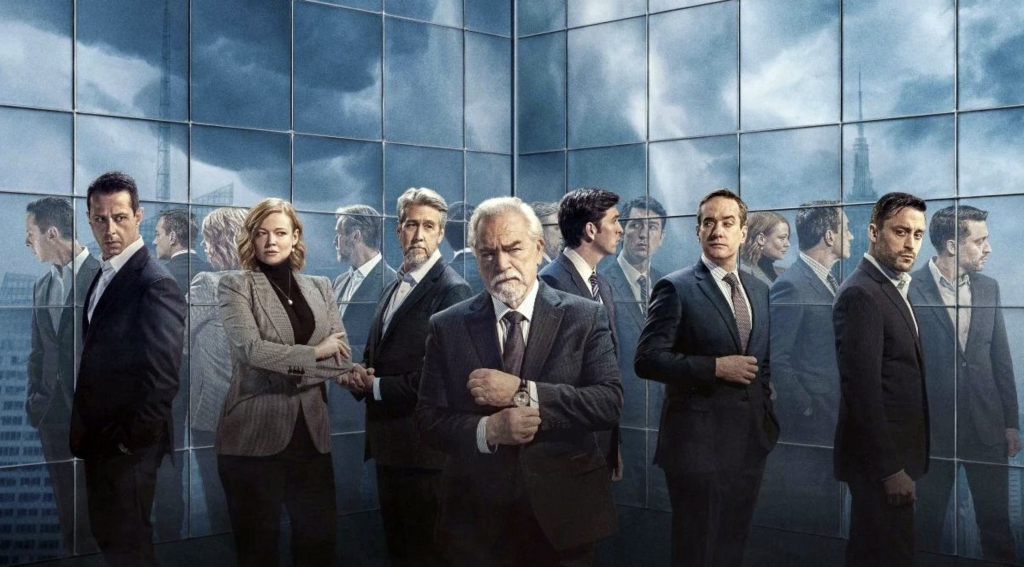This mid-season review will contain spoilers for Succession Season 4, Episodes 1-9.

Big shoes.
In the five years since its premiere in 2018, Succession has become infamous for its suspense, wit, and undercurrent of profound tragedy. Beyond its seemingly perpetual place in the zeitgeist, the story of an aging patriarch and media mogul deciding which of his grown children will inherit the title of CEO is, at its core, entertaining: Logan Roy (Brian Cox) is a modern King Lear, terrifying and brilliant, yet ignorant (at times defiant) to the fact of his own impending death. The Shakespearean dynamics satisfy the intellectual dramatist while witty, Sorkin-quick dialogue keeps the overall feel from becoming too bleak – the quips are so effective that, no matter how dark the storylines become, there is still a large camp of people swearing the show is a comedy first and foremost. The political satire is poignant, the business strategies are somehow compelling, and each character manages to earn viewer empathy despite their detestable natures. Kendall (Jeremy Strong) walks across the screen like an open wound, Siobhan (Sarah Snook) is as cunning as she is lost, and Roman’s (Kieran Culkin) sarcastic facade fades quickly when left alone to face his father’s wrath. Audiences see glimpses of the weak children beneath the wealth hoarders and agitators so that we root for their accomplishments, even when those wins come at a cost to the republic. Jeremy Strong said in an interview that the show hones in on a “malignancy at the heart of late-stage capitalism” and “familial trauma becoming societal trauma.” We are led to focus on the dynamics of the Roy family episode by episode, but Succession’s most poignant moments are when we are forced to watch the poison drip through into the world.
A number of reviews, op-eds, and video essays have noticed the show’s unique relationship to language; in a world occupied by political and corporate interests, few characters are ever at liberty to say what they really mean. Words are either used for negotiation, deception, or evasion. Conversations between characters only ever build tension rather than resolve it, making the seasons deeply suspenseful, even while most of the action revolves around DOW numbers and shareholder meetings. The final season is consequently tasked with both tying up the overarching business plots – the leadership of Waystar, the acquisition of other companies or vice-versa, even the president of the United States – and the underlying emotional conflicts that have gone unspoken by the characters.
If Kendall felt somewhat in the background for the early episodes of this season, it’s because he has been given the most opportunity over the past few years to move about and speak with honesty, even when he fails. One of Season 1’s most climactic scenes is Kendall merely stating the familial realities that they all know but won’t admit, describing in quick succession the corrupt motivations each sibling has for keeping Logan in power: “You’re all living in a fucking dream world.” Despite his frequent dips back into substance abuse and power-hungry maneuvers, he is undeniably the most developed sibling, insofar as just saying what he means. He’s been fighting against Logan the longest, and there is something Macbethian about the boldness of his moves once Logan is dead, no longer an opposing force. Roman plays a Shakespearean fool, telling truth “in slant,” distracting characters and viewers with profane one-liners while often saying something truthful and astute beneath the humor. The character with consistently the most to lose – and, thus, the one with most incentive to guard her feelings with manipulative language – is Shiv. She is shown throughout the first season to be capable of success outside of Waystar, climbing political ranks opposite ATN. In the outside world, she is undoubtedly the smartest (hence why every attempt Kendall makes to exit Waystar ends with him worse off than he started, and Roman never bothers to try). Once on the inside in Season 2, however, her intelligence is overwhelmed by her inexperience, and she is only able to secure her position as heiress if she is able to eliminate every other member of the family as viable options. She slyly puts down Kendall in front of Logan, exaggerates Roman’s blunders to make him seem volatile, and ensures Tom is so submissive in their marriage that he will never form a relationship with Logan strong enough for him to be named – going further in Season 3 as she endorses sacrificing him to prison.
Shiv uses deception more than the other siblings and succeeds at it almost every time, while Roman and Kendall’s ploys tend to be hit or miss. Kendall takes things too personally, Connor won’t engage, Roman can’t be serious, and Shiv can’t trust. These are the defining characteristics of the Roy siblings that have, up to this season, prevented them from teaming with one another. They all operate on different pages of Logan’s tyrannical playbook yet can never quite reach his level.
Naomi Fry wrote for the New Yorker that previous seasons have felt stuck in a loop, with Kendall going against Logan, Roman sticking diligently by his father’s side, and Shiv playing as many angles as she possibly can. There was excitement for the siblings to finally be a united front against their father, but there was also the vague worry amongst audiences that togetherness and familial trust would come off as forced, inorganic, and, at its core, un-Succession. These characters have been emotionally stunted since childhood, and their fatal flaws will not disappear just because the circumstances have finally aligned.
This fear was swiftly alleviated; the characters have developed, but their dynamics have not changed. The final season is taking a different approach from those prior – every episode has covered no more than one day’s events, making each installment insular and distinctive, but also forcing the show to focus on one thing per week, something it has failed to accomplish in the past. With Logan’s death taking place so early in the season, all of Season 1’s tensions and fears get to play themselves out in real time, and the alliance is short-lived once their father is no longer a force to be pushed against. There has always been an addictive discomfort to the voyeurism Succession’s camera work indulges in which is only amplified by insular storylines. The rash firings of studio executives, the bitter screaming match of an unhappy marriage, the decision desk of a conservative news outlet the night of a historic election – these all feel like things that we should not see, and thus relish in the privilege of seeing them. They are also exactly the kind of apotheotic moments in which the characters’ avoidance of true communication is tested and finally – finally – broken.
The dissolution of these facades comes in different forms. Kendall’s began in Italy when he confesses his responsibility in the waiter’s death to his siblings, as well as how broken he truly is despite the momentum of his war on Logan: “I’m all apart.” For Shiv and Tom, it is in the balcony scene in which the betrayals and unspoken issues of their marriage are at last vocalized. This was expertly foreshadowed in the season premiere, as Shiv chooses to go through a divorce silently rather than talk openly about their mutual suffering: “Let’s just walk away with our heads held high and say good luck”. Her avoidance of any communication in her relationship stems from a few motivating factors: her inability to trust (which we see play out with Logan), her need to be in power (which we see in business), and her insurmountable guilt, which is reserved exclusively for Tom. Tom is the only person she feels guilty enacting power over because he is the only one who has never fought her for it.
The Roy children have been taught from childhood that brutality is necessary in order to compete. Their business language is incredibly violent – to defeat someone in business strategy is either to “fuck them” or to “kill them.” Shiv’s ruthlessness, however, is the one with the most direct human consequence, given that Roman’s romantic relationship ends early in Season 1 and Kendall’s is over before the pilot. Shiv is the only sibling who brings someone into the family and into the business, two spaces in which no one is protected. Tom marries her expecting loyalty and support, both romantically and career-wise; Shiv, instead, sees him as just as much a threat to her interests as Logan, Kendall, and Roman. She picks him because, in her own words, he is “servile.” Season 4 has not been kind to Shiv, but it also feels somewhat of an inevitable arc for a character who has betrayed everyone and now has few people left on her side. Playing all her options works as a protective measure until those options begin to rest on loyalty and trust, two things she is uncomfortable giving, even to her family.
Whether or not her pregnancy was a necessary storyline to include will have to rest on the finale, but it certainly feels tied to earlier themes with Caroline in which she tells her own daughter that some people simply aren’t fit for children – “I should’ve had dogs.”
If Kendall is exhibiting Logan’s characteristics and Shiv is acting more like Season 1’s Kendall, Roman, in an unexpected turn, is morphing into Shiv. He still cuts every move with sarcasm but he no longer doubts the gravity of his instincts – instead, he gets off on it. In “America Decides,” he is so determined to make Mencken president that he employs devices of manipulation over the entire ATN office until Wisconsin is called red. The strategies he uses when speaking with Kendall, Darwin, or Tom are the same ones Shiv has used so masterfully: speaking constantly in order to overwhelm, interrupting anyone speaking with reason, and putting a time limit on the decision making to panic people into action. He is making bold moves with reckless abandon because there is no longer anyone around to punish him for being bold. He wants to be perceived as tough as Logan, a perception people below him find difficult to challenge now that there is no actual Logan around to undercut his choices. Shiv tries to point out their rashness but Kendall, out of empathy, chooses to trust his brother completely, giving him the momentum for Episode 8’s gut-wrenching pivot. It is then even more devastating to watch his delayed breakdown at the funeral, where Kendall, in an impromptu eulogy, wields language with precision, honesty, and skill. It is the only speech given by a sibling that comes close to resembling Logan. There was a certain tragedy in watching Logan humiliate Roman for any rogue ambition he had – it is even more tragic to show that his refusal to grant Roman power may have been the right move.
Kendall is the black sheep of this season, as both his success and his failure feel impending, epitomized by that taunting black line under (or over) his name. He has taken control during crises more than any other character – Logan’s death, Living+, and Logan’s funeral – and has, despite all odds, won out. His off-the-cuff eulogy was honest and manipulative at the same time, a paradox only Logan has been shown capable of being. It was convincing, critical, and awe-inspiring, wrought with many of the same Shakespearean phrases that echoed in his father’s dialect. It rerouted the narrative after Ewan’s unexpected speech with speed and emotion. But such skill does not come without cruelty – after comforting Roman for his collapse in the church, Kendall is not hesitant to point out the hopelessness of their position with Mencken, telling him over and over, “it’s okay, but you fucked it.” Is he wrong? Not entirely. Roman went through with the Wisconsin call without realizing how little Mencken would need them after he’d gotten his end. Kendall also decided on the call after learning of Shiv’s betrayal (a remnant of his habit to take things to heart) but the move had been in motion all day by Roman, and it is he who will ultimately be to blame if Mencken’s presidency does not prove beneficial to the Roys.
The past two episodes especially have taken both the business and emotional plots to their discomforting extremes. The Roys’ positions are, in many ways, mirroring the pilot’s, with Shiv on the outside, Roman ridiculed, and Kendall looking closer and closer to ascension. The finale premiering this evening has a difficult job to do, naming the successor as well as bidding farewell to one of the best shows on television in recent years. Succession has provided four seasons of tight, profoundly tragic writing, performed by an unrivaled cast of actors – it will be fascinating to see which shows might attempt to succeed it.





Be First to Comment